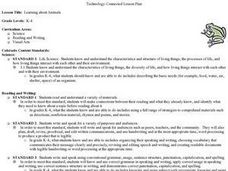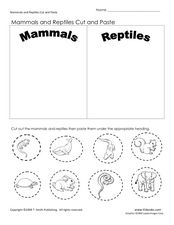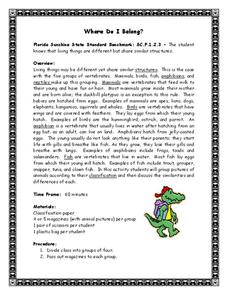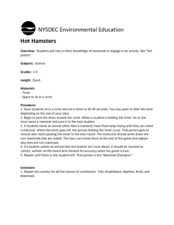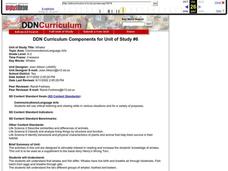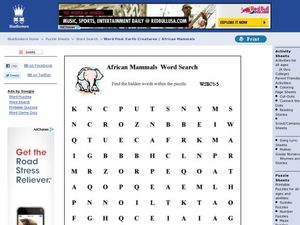Curated OER
Animals Multiple Choice Definitions Worksheet
In this animal vocabulary worksheet, students complete multiple choice questions where they define the animal terms given to them. Students complete 7 questions.
Curated OER
North American Animals
Students are introduced to the anatomy and characteristics of the North American wolf, grizzly bear and bobcat through a purchased kit. They cast plaster models of each of the animals for study and display.
Curated OER
Learning about Animals
Pupils chose one animal to research. They research the animal using the internet using the sites provided. They also research using books from the library. They conclude the lesson by writing a one page story about their animal which...
Curated OER
Everything in Its Place: Science Classification
Students investigate the system of classification for living things through the sixteen lessons of this unit. The five kingdoms of monerans, protists, fungi, plants, and animals form the basis of several experiments as the similarities...
Curated OER
Describing Animals Crossword Puzzle
In this animals crossword puzzle worksheet, students use the 20 clues to identify the correct animal-related terms that will solve the crossword puzzle.
T. Smith Publishing
Mammals and Reptiles Cut and Paste
Adorable! Most children are really drawn to animals. With this worksheet, they cut out eight darling drawings of animals and then affix each to a page divided in half according to whether it is a mammal or a reptile. If you need it, an...
Curated OER
Where Do I Belong?
Fourth graders work in groups. They are given magazines. Students cut pictures of five mamals, five birds, five reptiles, five amphibians, and five fish. They place the pictures in a plastic bag. Students switch bags. They are explained...
Curated OER
Classification of Intertidal Organisma
Students categorize animals. In this animal classification lesson plan, students group animals by their characteristics. Students break into groups and work together to classify the animals. Students fill out a graphic organizer with...
Curated OER
Characteristics of Snakes and Turtles
Students examine the characteristics of snakes and turtles and compare/contrast reptiles with mammals. They watch a video, answer discussion questions, complete information charts, conduct Internet research, and create a habitat diorama.
Curated OER
Are you an Animal Sleuth?
Students define and identify both wild and domestic animals as well as mammals and non-mammals. In this animal safety lesson, students distinguish between animals that can carry rabies from those that cannot. Students use stuffed animals...
Curated OER
What's Wild
Third graders discover the differences between wild and domestic animals. In this animal lesson, 3rd graders chart the differences in the animals and look through magazines for pictures of wild and domestic animals to glue to a poster....
Aquarium of the Pacific
Turn a Cow into a Whale
Third graders explore animals that might have a common ancestor and resemble one another. For this cow and whale lesson, 3rd graders recognize the similarities between the whale and the cow. Students complete worksheets based on the...
Curated OER
Investigation: Reasoning and Proof
Students explore animal characteristics by creating illustrations. In this animal identification lesson, students read a list of animal descriptions which they draw using crayons or colored pencils. Students view their drawings and...
Curated OER
What Is Happening To My Species?
Learners select and research an animal that lives in the rainforest of Manu, Peru. They watch and discuss a video, create masks and costumes to role-play various rainforest animals, conduct research, and write a short story of their...
Texas Instruments
Can You Breathe Like a Pinniped?
Young learners compare the breathing patterns of different animals in this pinniped lesson. They examine the breathing pattern of California sea lions and northern elephant seals. Pupils collect, compare and analyze data concerning...
Curated OER
Hot Hamsters
Using this quick activity, you can have your class review what they have learned about mammals. Learners sit in a circle, and take turns naming a mammal. This activity could be enriched by having learners go to their desks, identify a...
Curated OER
Whales
Students compare the differences between whales and fish. They examine the differences of toothed and baleen whales. They identify behavioral and physical characteristics of animals that help them survive in their habitat.
Curated OER
Classification Wordsearch
In this science worksheet, students examine 20 words in a word bank; all pertain to animal classification. Students locate each word in a word search puzzle.
Curated OER
Animal Classes-Mammal Birds Fish Reptiles Amphibian
Students learn about the characteristics of each animal classification. In this animal classification lesson students will first learn the characteristics of each classification. Then, they will find animals from given materials and...
Curated OER
Learning About Animals' Bodies
Students research different animals (mammals, reptiles, amphibians, insects, birds, fish) and create books, murals, dioramas, puppets, and sculptures to illustrate the necessity of various body parts for overall survival. In this animal...
Curated OER
Animal With Hooves
In this animal coloring worksheet, students study and color an outline picture of an unidentified mammal with hooves. There are no directions.
Curated OER
Mammals And Reptiles
In this animal learning exercise, 3rd graders study the aspects of the different animal classifications of mammals vs. reptiles. Students cut out 8 animals and paste them on the chart in the correct category.
Curated OER
African Mammals Word Search
In this African mammals word search instructional activity, students locate the 10 animals listed in the provided word bank within the word puzzle.
Curated OER
Crossword Puzzle- Mammals
In this science crossword puzzle worksheet, young scholars use 11 clues and animal pictures at the bottom of the page to complete the puzzle which is located at the top. They check their answers with the solution given in the bottom...




